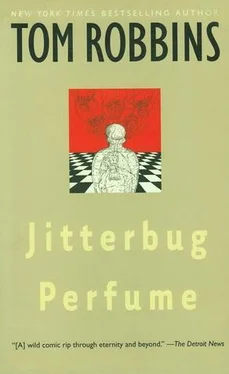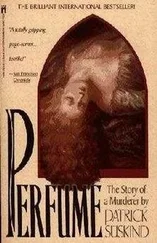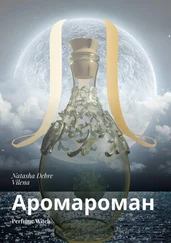On a day such as that one, however, a day popping its seams with sunshine, lust, and adventure, it was difficult for him — or Kudra — to conceive of anything worse than annihilation. So, they advanced in the lavender mountain haze like chatty autograph-seekers closing in on a celebrity's hideaway, but in their secret hearts they wanted something other than your scrawl, Mr. Shaggy; they wanted you to reach into their secret hearts and remove the hard, knobby doggy bone of doubt that their apparent victory over time had buried there.
“We have been living in Constantinople among the Christians,” explained Alobar.
“The Christians doth be everywhere,” said Pan.
“Not in my homeland,” said Kudra.
“They will be,” said Pan. A wave of faintness and nausea broke over him. He ignored it to concentrate on Kudra's mounds.
“Prior to that,” said Alobar, “we lived in a cave far away in the East. Have you ever heard of the Bandaloop doctors?”
“No,” said Pan. “Don't be stupid.”
Alobar reddened. “You've been around a while. I thought someone might have mentioned Bandaloop to you.”
“I am Pan,” said Pan. “People do not mention things to me.”
“Your point is well taken,” said Kudra. Pan grinned at her lasciviously. Alobar glowered.
“I will play for thee,” said Pan, producing his reeds.
“We wished to talk to you about immortality,” protested Alobar.
“Thou art too late,” said Pan. He blew a few weak notes on his pipes.
“Too late for talk or too late for immortality?” asked Kudra.
Pan's instrument made a sound, high and thin.
“Too late for us or too late for you?” asked Alobar. He had noted the god's physical decline.
“Thou art interested in the immortal, this be immortal,” said Pan, and he commenced to pipe in earnest.
“But—” objected Alobar.
“Your point is well taken,” said Kudra.
Alobar glowered.
Before she met him, before they flushed him from his thickets, Kudra had imagined Pan to be a giant, a winged monster with fire-blackened hooves and more arms than necessary for the discharge of polite duties; imagined him smoldering, hissing, uprooting trees and spitting hailstones, instructing humanity in a thunderous tone. She was frankly disappointed when he proved to be slighter in stature than her Alobar, and she could barely keep from sniggering at his foul tangles of wool and his silly tail. Even his stench failed to measure up to Alobar's description of it, striking her as more locally naughty than universally nasty. It wasn't until he began to pipe that Kudra got some sense of Who (or What) He Really Was.
At first, his playing, too, seemed slight; it was so simple, careless, and primitive that one had to sympathize with Timolus, who, judging the music contest between Pan and Apollo, had unhesitatingly awarded the prize to the Apollonian lyre, thereby establishing the tradition that critics must laud polish and restraint, attack what is quirky and disobedient, a tradition that endures to this day. Had Timolus not hooked Pan off the stage so quickly, had he possessed the — the what? the honesty? the humility? (Timolus, after all, couldn't play shit) the nerve? to actually listen to Pan, to respond with something more genuine than his preconceptions, he might have been affected, as Kudra began to be affected, once she stopped smirking at his obvious lack of formal training and quit comparing him unfavorably with the flutist, Lord Krishna. Pan's song, because it served no purpose, because, indeed, it transcended the human yoke of purposes, was, above all, liberating. It was music beyond the control of the player's will or the listener's will; the will, in fact, dissolved in it (which may explain why it was politically necessary for Apollo, with the compliance of Timolus, to drown it out). To Kudra it was the aural equivalent of the rope trick: a giddy ascent up a shaky coil, to arrive in a place of mystery, where the sense of all-encompassing oneness with the natural world and the sense of the absolute aloneness of the individual coexist and commingle. There was a sort of hippity-hoppity bunny rabbit quality to Pan's erratic melody, but also a roaming goatish quality, stubborn, rough, and lean. If at one instance it sounded tender and idyllic, at another, threatening and brutal, perhaps that was because Pan's song was the inner animal's songs, all of them, summed into one seemingly random epiphany. Kudra felt that at Pan's concert she was on less than solid ground, yet, as unsteady as that ground might be, she was driven to dance upon it. (Maybe there is no proper way to react to the inner animal's tunes but dance to them.)
Kudra found herself swaying rhythmically and wiggling her grass-stained toes. She turned to Alobar to find him executing a little shuffle, snapping the fingers of his left hand while with the right he defined a tempo by shaking the charred remains of her half-smoked shoe. Kudra was amused by Alobar's tentative polka until her eyes fell upon the tumescent protrusion dancing with him. Disgusting , she thought. An erection is just inappropriate . Then she realized with a shock that she was so wet that children could have sailed toy boats in her underpants.
The next thing she knew, she and Alobar were dancing up the hillside, following the Charmer's pipes through thistle bushes and over jagged rocks; and while panic fear erupted with a roar from her deepest places and while she overheard Alobar plaintively asking, “Doesn't it matter to you that she is my wife?” she was incapable of turning back.
The refined erotic engineering taught by the Kama Sutra had not prepared Kudra for that night of priapism, but the following morning, after she had sponged her chafed parts in the grotto pool and smeared them repeatedly with the aromatics that she lugged about in the teapot (even so, the goat smell was to cling to her for weeks), she found that she and Alobar could face one another without shame, and she nodded in total agreement when Alobar ventured, “I feel somehow that his lechery was secondary, although to what I cannot say.”
For breakfast, Pan served them olives, tomatoes, and cheese, which they ate in the nude without a trace of self-consciousness. Throughout the meal, the sleepy-eyed god kept testing the air, more like a hare than a goat, until at last Alobar inquired what he might be sniffing.
“Flowers, methinks, but unlike any flowers that bloom in these parts. Most strange. Dost thou smell them, too?”
“You are smelling my perfumes,” said Kudra, and when Pan looked puzzled, she thrust her shoulder under his nose. His bewilderment increased. “Thou didst not smell like that last night,” he said.
Alobar made a move to produce the perfume jars, but Kudra caught his wrist and bade him wait. “We puny homers, as you call us, have some magic of our own,” she said. “Tell me, do you find the aroma unpleasant?”
“It be quite pleasing — from a blossom. A woman shouldst smell as thou didst last night.”
“Bah! You Western males are all alike, whether you call yourselves gods or men. You've had your noses in too many battles and too many hunts. Alobar used to hate perfumes, but when he came home from the warehouse every evening accidentally smelling of nutmeg and cinnamon and tumeric, he grew accustomed to the idea that flesh is more appealing when not left to marinate in its own rank juices. Here. Close your eyes for a minute. Just for a minute. Go ahead. Trust me.”
Reluctantly, Pan lowered his big monkey lids, whereupon Kudra doused him with enough patchouli to stampede a herd of elephants. His eyes flew open like the hatch covers on an exploding ship, and he commenced to sniff at his extremities, as if he were wildly in love with himself. A kind of disorientation seemed to seize him, causing him to walk in circles, repeatedly crossing his own path. The nymphs, who had entertained Alobar during the night while Kudra was being entertained by Pan, laughed nervously from their mossy lounge across the pool. One of the nymphs sidled up to the god and pulled his tail with a petal-picking gesture, only to be flung violently to the ground. At last, Pan sat down between Kudra and Alobar, still inhaling drafts of himself with expressions of disbelief, and began to speak in the most subdued tones Alobar had yet heard him employ.
Читать дальше












